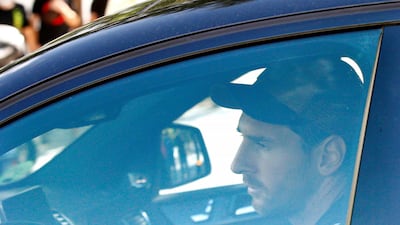Over the course of 11 days, following Lionel Messi's shock announcement on August 25 that he intended to leave Barcelona, the club he had been with for 20 years, world football shook with anticipation of what would happen. By September 4, he had accepted – albeit unhappily – that he must stay in the face of the Spanish club's refusal to sanction his exit unless €700 million ($823m) was paid to them, as stipulated in his contract. It seemed that the drama was over before it had a chance to get properly going. However, that was probably only the first act.
Messi is arguably the most talented and successful of all who have played the game. That he was ready for a fresh challenge and a new home is not in itself remarkable. Players move clubs all the time. But in Messi's case, he had become synonymous with Barcelona, where he has been since he was an under-sized 13-year-old, winning 33 trophies along the way.
The Argentine star could still leave Barcelona, possibly before October when the transfer window in England shuts, or in January when it re-opens, or almost certainly in June when his current contract expires. Expect more noise and fireworks before his future is finally settled, because the bigger picture is a swirling landscape of change throughout European football, spurred by the impact of Covid-19.
The economic pain felt by clubs, when from March no matches were played until the season resumed in June, was very real. Most elite clubs across the top leagues in England, Spain, Germany, Italy and France are now facing new realities on the eve of the 2020/21 season.
For the foreseeable future they cannot expect fans to be back in stadiums at the attendance levels they achieved before the outbreak, thereby reducing gate receipts. Sponsors around the globe are being forced to address their own financial priorities, putting pressure on teams' commercial revenues.
Trends that had begun to emerge in recent years have been accelerated – like so many other things – by the pandemic. Most significantly the value of television broadcasting rights is likely to have plateaued and may even be about to decline.
The English Premier League, the richest of them all, has just cancelled its China TV deal after missed payments. This could trigger a legal battle, hindering the league's ability to secure a new broadcast partner. Even before the crisis, there were signs that the inflation game that football clubs have been playing for two decades may have run its course.
Domestic broadcasters had already been unwilling to pay more for Premier League football even as international TV rights continued to rise in value. The Premier League's China decision is a watershed. The country was set to be a big driver of future growth for football. It may still be but it won’t be as smooth a ride as expected.
Global accountants and consultants Deloitte have called football “recession proof”.
“The live and unscripted drama of football coupled with sport’s ability to bring people together in a positive manner has created a seemingly largely recession-proof industry that has performed well in both bull and bear markets,” it said in its analysis of the 2018/19 season, when the top 20 clubs earned €9.3 billion in revenue.
This has been broadly true during the 2007-08 global financial crisis and other economic downturns. This time, however, it doesn’t seem like football will escape the impact of external factors. It is likely to be a tough season off the pitch, and one filled with uncertainty.
Meanwhile, Messi looms large. Why? Because he offers opportunity instead of fear for any club that he might join after leaving Barcelona.
Once football did get going again in the summer, TV audience figures were actually higher – up 48 per cent on average for Spanish games, according to Reuters – as more people stayed home. With coronavirus-related restrictions staying in place for some time, television will become even more important for football, and the most popular clubs will benefit more than those with lower profiles.
It is the few star players, such as Messi, who will make the difference in a fast-changing media landscape. Deloitte says that “increasingly some fans may have more allegiance to an individual player rather than a club because they can connect with the player directly”.
It has found that 75 per cent of the 20 richest clubs have fewer followers on their club Instagram account than their most followed players. Portuguese star Cristiano Ronaldo has, at 196m, almost six times the number of followers that his club, Juventus, has. At 140m, Messi has almost twice that of Barcelona. Sponsors and broadcasters understand this power, and they prize the popularity of these players above that of the clubs and leagues that they are a part of.
That is why Messi, as expensive as he would be for any club to sign, is in today's world actually worth more than people think he is – despite his age. At 33, most footballers are past their peak on the pitch, but perhaps not the greatest player of his generation.
And now that he has made it clear he is open to going elsewhere – and in terms that make it very hard for him to stay at Barcelona beyond next summer – expect a queue to emerge in the next few months. Top clubs will jostle for the chance to sign him, as they begin to realise how much harder their business is going to be from now. They will come to see that the economics of Messi make more sense than those of football itself.
Mustafa Alrawi is an assistant editor-in-chief at The National


























































































